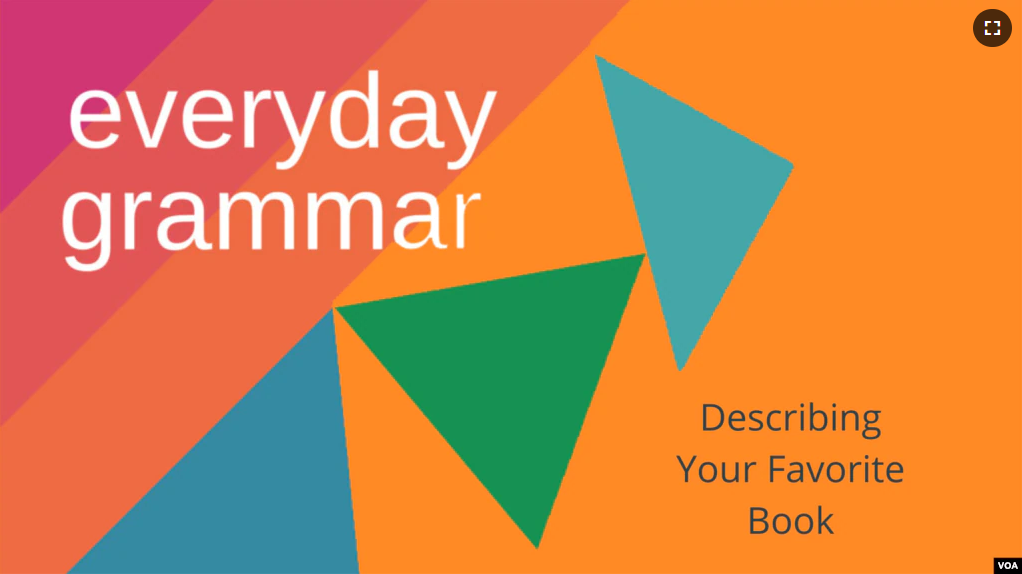In a recent Everyday Grammar story, we asked our listeners and online fans to tell us about their favorite books. We received many wonderful messages from our audience around the world. Thanks to all for the great exchange.
In today’s report, we will take a close look at one of these notes. Language teacher Orhan wrote to us from Iran, where he teaches Turkish.
Orhan described an important day and an important book in his life.
Orhan’s message
He wrote:
I am Orhan from Iran.
When I was 20 years old, I was visiting my father’s family in Tabriz that I saw my cousin was reading a book in Turkish.
We suggest removing “that” and breaking the sentence into two shorter statements. The sentence could also use the simple past – “visited” instead of “was visiting.”
The updated sentence could be something like this:
When I was 20 years old, I visited my father’s family in Tabriz and saw my cousin reading a book in Turkish.
Orhan’s next line gives more details about why the Turkish book interested him:
Despite being millions of Turkish speaking people in Iran , our mother language , Turkish , is not formal and there is not schools that teach in Turkish so I didn’t see a Turkish book until that day.
We suggest breaking the sentence into shorter individual sentences and then re-ordering the ideas. Let’s put the sentence, “I had never seen a Turkish book before that day,” first. It flows well from the sentence just before, “… and saw my cousin reading a book in Turkish.”
There are a few grammatical changes we might make as well. For example, “…there is not schools…” should be “there are no schools….”
We also suggest replacing “despite” with “although.”
The updated sentences might go like this:
I had never seen a Turkish book before that day.
Although there are millions of Turkish speakers in Iran, Turkish is not an official language. There are no schools that teach in Turkish.
Orhan then wrote:
Based on my request my cousin gave me that Turkish book.
The sentence could be simplified to the following:
My cousin gave me that Turkish book.
Then Orhan explained the effect the book had on his life.
I learned grammar of Turkish by reading that book and interested in Turkish literature so I went Turkey to study Turkish literature.
We suggest using “Turkish grammar” instead of “grammar of Turkish.” The updated sentences might go like this:
I learned Turkish grammar by reading that book. I became interested in Turkish literature, so I went to Turkey to study the subject.
Orhan ends his piece with:
That thin book is my favourite book and changed my whole life.
The ending words – “changed my whole life” – are the most important. They could stand as their own sentence, as in:
That thin book is my favorite book. It changed my whole life.
Closing thoughts
Here is Orhan’s message with our suggested changes:
I am Orhan from Iran.
When I was 20 years old, I visited my father’s family in Tabriz and saw my cousin reading a book in Turkish. I had never seen a Turkish book before that day.
Although there are millions of Turkish speakers in Iran, Turkish is not an official language. There are no schools that teach in Turkish.
My cousin gave me that Turkish book. I learned Turkish grammar by reading it. I became interested in Turkish literature, so I went to Turkey to study the subject.
That thin book is my favorite book. It changed my whole life.
We thank Orhan for his message and wish him continued success in his teaching and in his English studies.
If you would like to receive writing advice, write us a short message of 4-6 sentences. Talk about your favorite movie – when you saw it, what it means to you. Maybe your message will be chosen for our next exploration of writing on Everyday Grammar.
I’m John Russell.
John Russell wrote this lesson for VOA Learning English.
________________________________________________________________________
Words in This Story
update – v. to change (something) by including the most recent information
grammar – n. the whole system and structure of a language
cousin – n. a child of a person’s uncle or aunt
despite – prep. in spite of
formal – adj. following established form, custom, or rule
